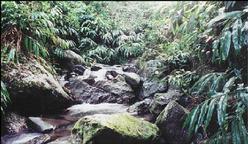By Andrew Smith, Staff Reporter
River in the Blue Mountains. - Andrew Smith/Staff Photographer
MOUNT AIRY is a small community in northern St. Andrew's coffee growing region. Located in the rugged Blue Mountains, three-quarters of the population are under forty years old. As such, there is a need for gainful employment for farmers and their families. In the never-ending struggle for land among small farmers, large landowners and conservationists, the small farmers feel that they are coming out the loser.
HIGHLY SENSITIVE LAND
Land usage in the environmentally-sensitive Blue Mountains has always been controversial ever since coffee was introduced to Jamaica in 1728 at Temple Hall, St. Andrew. Freed slaves migrated from the sugar plantations to the mountains to either work on the coffee plantations or to plant their own crops, including coffee.
Improper growing practices by coffee farmers resulted in widespread land degradation in the Blue Mountains. This is especially evident in such communities as Penlyne Castle in St. Thomas and in the Port Royal Mountains of St. Andrew. The need to safeguard the mountain's unique biodiversity and to prevent further watershed degradation resulted in the establishment of the Blue & John Crow Mountains National Park in 1991.
SMALL FARMERS' CONCERNS
Austin, a small farmer from the community, agrees that the watershed needs to be conserved. However, his main concerns are lack of support from the government and availability of land. Concerning the former, he says that no extension officers from the Coffee Industry Board (CIB) have visited Mount Airy in years. Mr. Graham Dunkley, Director General of the Coffee Industry Board's Regulatory Division, admits that the number of field staff has been reduced. From a high of 150 extension officers in the mid-1980s, there are now only 12 for the entire island. This is as a result of a diminution of externally-funded projects which focused on increasing land acreage under coffee production. The end of these projects resulted in the laying-off of the associated extension staff.
The farmers also see the Coffee Industry Board as impeding their desire to increase their standard of living. Austin claims that the price that the CIB pays farmers has remained constant for the past twelve years. This is contradicted by Mr. Dunkley, who states that the price per box for the 1990/91 crop was J$472.00, and for the 2001/02 price was J$1,864.00 per box.
What has remained constant since 1993 is the cess of J$91.00 per box which is charged by the CIB. This cess is imposed to pay administrative costs and to improve the CIB's research, nursery and extension services. An increase in the cess would assist the CIB in providing better service to farmers. This increase would require an amendment in Parliament by the Ministry of Agriculture. Until this is done, the scope of improvement that the CIB can do is limited. Mr. Dunkley states that "if more resources are provided to me, I would be able to do more."
UNEQUAL LAND DISTRIBUTION
Land is a contentious issue. Austin says that the government's call for the youth to go back to the land cannot be answered in Mt. Airy because there is no available land. Lack of land results in migration form the community or squatting on the forest reserve or on large land owner's property. Youngsters who want to go into farming attempt to do so in the National Park, as was the case of 25-year -old Robert (not his real name). After clearing 5 acres of land, he was evicted by the Forestry Department.
With Mr. Dunkley stating that the C.I.B. hopes to keep acreage constant while increasing productivity yield per acre, the challenge is increased. "De big man dem" in possession of hundreds of acres are identified by Austin as potential sources of alleviating the land availability problem. He pointed to a plot of land which is now cultivated by small farmers which he says was sold to the small farmers by the previous owner, Dr. Marshall Hall. Other under-utilised land could be made available to these farmers.
Lessons can be learned from over ten years ago when the National Park was established. All land users and relevant agencies formed Local Advisory Councils (LACs) at Hollywell, Epping Farm and Millbank. At these LACs, issues relating to land use and conservation were addressed and resolved with all participants forming a concensus. This is along the line of Mr. Dunkley's desire to form the farmers into groups to allow for better communication between the CIB and the farmers. Austin identifies Jamaica Labour Party Member of Parliament Andrew Gallimore as someone who has indicated an interest in this land issue.
If all of these players come together, then the country will see an avoidance of the street protests by the farmers which took place last year. If not, a mass gathering could occur over the next few months













